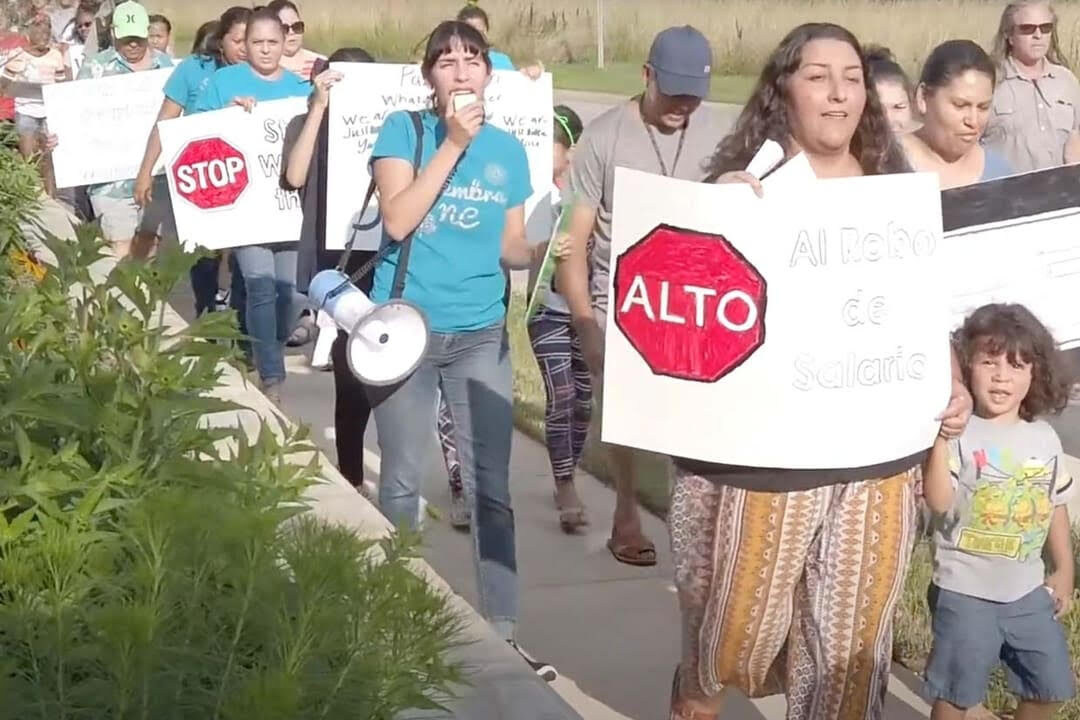If campaign organizing is a series of peaks and valleys, 2021 has already brought many of us vertigo. I’ll never forget the euphoria I felt driving home to North Carolina on January 6th, after five days canvassing in Cornelia with other Mijente members and the Georgia Alliance for Human Rights Action. By the time I pulled into my driveway, that feeling had been replaced by dread, as the whitelash in DC played live on my local NPR station. Over the days to come, a new president would announce good news, like the appointment of Elizabeth Warren’s advisors to key roles and a suspension of deportations. Now, with a delay on Census maps throwing our 2021 electoral plans up in the air and child migrant facilities opening across the country, the dread is back.
In my conversations with organizers around the country, it’s clear a lot of us are also feeling a profound loss. Six months ago, we all had an opponent, a goal, a timeline. Now, the playing field is much less clear. Which opponents should we focus on? What should we push them to do? Where are there points of tension or disagreement in our wider coalition? And, crucially for base builders, what is the urgent call to action we’re using to motivate our people, after years of so many urgent recruitment pitches?
Here in North Carolina, our grassroots Latinx base-building shop, Siembra NC, grew out of the Trump Administration’s attacks on immigrants. Our neighborhood-based community defense programs — which were the backbone of a statewide voter registration and voter contact campaign that knocked tens of thousands of doors last year — took off in response to those attacks. But now our primary opponent, who energized many of our new members, is no longer in office. We’ve seen a significant decrease in ICE detentions since the new administration took office, and we’ve had more success than ever with campaigns to release detainees — raising the question, what’s the role of an immigrant community defense group as the risk to immigrant communities declines?
Our electoral success has disrupted our organizational orientation, particularly for those of us who built an entirely new base in the last four years. Before Election Day, our team did a planning exercise. What would our issues and strategies be as an organization if Trump remained in office? What would they be under Biden? Our takeaway was surprising: we were much clearer on our purpose under a second Trump term. Our plans for a Biden administration were hazy. We joked about what our “awkward teenage years” might be like if a new president were inaugurated. Would immigrants be more inclined to fight back against wage theft, or less? Would our younger members be as motivated to register Latinxs to vote?
We’ve won a new organizing terrain, but for many of us, this success changes the math about why our people joined and what they want to win with us. We’re already seeing some of our member volunteers report less interest in participating compared to last year. This is a new moment, and we don’t have as many answers as we did last year.
Here are some of the lessons our crew is turning to as we navigate this new ground.
Make friends with doubt. In early 2017, the handful of us who would go on to form Siembra took a while to let doubt in. Over the course of the year, experiment after experiment — from seeking sanctuary in churches, to power of attorney clinics, to neighborhood-based canvassing — failed to take off in the ways we wanted. We finally realized how little we knew about our new terrain. We did not know which strategies would prevent detentions on a wide scale, much less how to activate thousands of Latinxs to join the Black-led project of building long-term statewide electoral power. Admitting that made us better at spotting what did work later on. Katey Lauer of West Virginia Can’t Wait recently wrote that “doubt is knocking on our big old door.” Being in touch with doubt in 2021 means revisiting our assumptions about what organizing plays to make, and which of our rules as basebuilders we may have to suspend to win in this new environment.
Question your rules. All organizers have rules. In early 2017, I would have told you that if you gave away money to the constituency you were trying to recruit into your base, you were a service provider, not a base builder. That was my rule. But in July 2017, as we were trying to adapt as fast as we could to the gaps created by stepped up ICE arrests, we realized we had to get the families of those detained emergency cash assistance. Slowly, by word of mouth, news of the fund spread to families impacted by ICE, which, in turn, raised awareness about our 24-hour defense hotline. Eventually, many families hosted fundraisers for the fund, led “Defend Your Rights” canvassing in their neighborhoods, and organized permanent defense committees in their counties.
Let’s fast forward to May 2019. Five buses filled with working-class immigrants, largely from rural counties, pulled up in Raleigh at the NC Sheriff’s Association headquarters as part of a campaign to convince the Democratic governor to veto an anti-immigrant bill. Many had become Siembra members only after helping host a grassroots fundraiser for the Solidarity Fund to lend material support to a neighbor or friend impacted by ICE. They wanted to “be helpers,” not necessarily to fight back. But after the fundraiser, we could convince them to attend a Defend Your Rights training. If we hadn’t been willing to suspend our instincts as base builders and break a rule like “don’t give away money,” we wouldn’t have tried what became one of our most successful experiments.
Find your “Ozone.” Imagine going on a long hike in the woods. Instead of the predictable path you expected on the way back, you find yourself going in circles, facing a seemingly different terrain. That’s what I felt in 2017. After years of grassroots base-building experience, my instincts felt off in a serious way. A few of us in Siembra started reading old Southern organizing histories to mine wisdom from our ancestors. The one that ended up being the most helpful was Myles Horton’s story about learning to evaluate an organizing strategy on the basis of whether it would “play in Ozone,” the town in Tennessee where he first tried his hand at recruiting and developing working-class leaders. It took us about fifteen months to decide our “Ozone” was a particular mobile home park in rural Alamance County. When our members there supported a new campaign or initiative, many others we wanted to organize often did too, and when they didn’t, it was a sign we needed to refine our approach. It became the place we tested our community defense strategies before bringing them to our members in other counties, and it sharpened our planning conversations. Today, our base is broad enough that we have several “Ozones,” but at the time, it was an invaluable compass point for us.
Say goodbye with grace. One of the most difficult and important decisions we made when we formed Siembra was to part ways with a few incredibly dedicated collaborators who didn’t agree with us on how to change our organizing strategies after the 2016 election.The tactics that worked for immigrant organizers under Obama were no longer viable, and the urgency of building a base meant we did not have time to waste debating which experiments to try: we had to begin, right then. We are going through a version of that now: not all of our members who signed up to build power as a form of community defense will feel the same urgency under the Biden administration. Whereas a group of our younger members (who call themselves the “Siembra Primxs”) responded to the Georgia runoff results with a study group focused on how they could help replicate the success of groups like the New Georgia Project in our state, others have let us know they feel relieved there won’t be as much of a need for organizing post-Inauguration.
Hang out with inconvenient questions. As an organizer, I can most often tell something’s going well because I’m getting questions like, “Where can I show up?” “What else can I do?” “Can my cousin come too?” But in 2017, our team went months without hearing questions like that from the people we were trying to organize. Once in a while, though, we saw a surge in interest and thought our base-building fortunes had changed. At one point, for eight straight weeks, our mass meetings at local elementary schools and Catholic parishes were filled with Latinxs who did not usually go to mass meetings. But then, participation petered out. When DACA was under attack later that year, we again hastily decided we had built a base around an issue that would continue to feel urgent; but by January 2018, DACA was no longer in immediate jeopardy.
The third time, we were ready: our team was cautious and critical, asking each other not only why we thought people were turning out but how we knew that was true. “What if a lot of our new contacts just want to solve a short-term problem unique to this moment? What should we be doing right now to develop deeper connection?” These questions were tough because they forced us to question whether our organizing “lanes” — our issues, like wage theft, and our strategies, like community defense — were relevant to the people we were trying to recruit, and whether we had enough leverage to bring immediate relief under the Trump Administration. But over time, these questions sharpened our ability to spot legitimate base-building opportunities that emerged.
Conclusion
Organizing under the last administration was exhausting: four years of constantly trying to pivot away from being on the defensive, despite almost weekly attacks on our communities, either from federal agencies, local and state authorities, or vigilantes emboldened by a white nationalist in the White House. But for all the chaos, some of us found a rhythm as organizers. We learned to quickly assess and triage new policies; we could absorb and onboard new faces who turned up during rapid response mobilizations; we deepened our members’ commitment to supporting fights they sometimes considered far removed from their own.
It took a long time for many of us to find that footing after the 2016 election, and now that the political geography has shifted again, it may take some time to regain our rhythm. We should revisit the practices that have helped us navigate other moments of disruption. When we did an inventory of what’s worked over the past four years, Siembra’s organizers listed embracing doubt, questioning our rules, keeping in mind our “Ozone,” saying goodbye with grace, and spending time with inconvenient questions. This list will no doubt be different for others. What’s important is to recognize when we are struggling to find our footing, and make extra time for reflection.
Thanks to Katey Lauer, Naomi Long, and Zein Nakhoda for editorial support.

